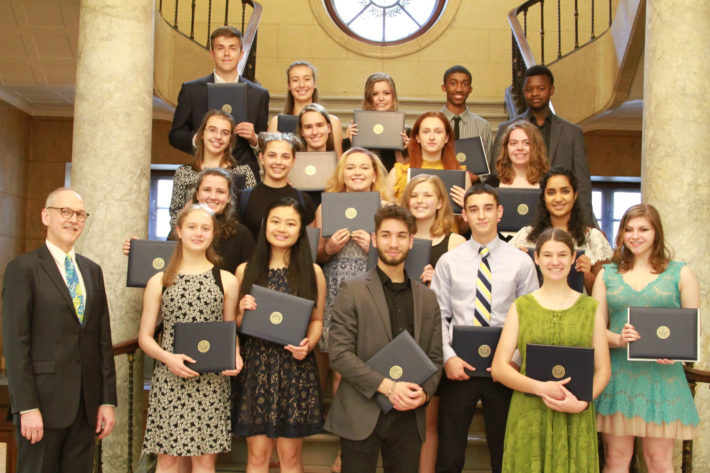Creating the Complete Musician
May 3, 2018By Hattie Bestul – Eastman Arts Leadership Program, ECMS Marketing and Operations Intern Spring 2018
Intentionally striving to provide a holistic array of musical opportunities, the Eastman Community Music School serves 4-month-olds to adults of any age and includes everything from lessons and ensembles, history and theory, to more specific subjects such as the new “Music Recording and Production” class. The variety in ECMS offerings reflects its philosophy that a well-rounded musician will experience deeper learning, greater success, and more joy in their music-making. This multifaceted enrichment is central to the ECMS Diploma Program: a comprehensive musical training encompassing a well-balanced blend of private instruction, performance, and academic coursework.
Motivated students in grades 7 and up may pursue a diploma of their choice which recognizes their efforts in becoming excellent music performers and scholars. Students’ achievements are celebrated at the annual Commencement and Awards Ceremony in June. General requirements include: private instrumental or voice lessons, annual juries or exams, performances in ECMS recitals, music theory, music history, keyboard proficiency, and ensemble participation. Students who choose to pursue the Advanced Diploma or Pre-Collegiate Diploma will be required to complete additional years of private instruction and ensemble participation, as well as more music theory courses. ECMS Theory and Composition Chair Margaret Henry, who helped design diploma requirements, encourages all ECMS students to consider the Diploma Program.
Henry notes that the earlier students begin, the more opportunity they have to advance to upper level courses and that a good time to consider the program is when they enroll in Fundamental Musicianship: Theory & Aural Skills 1. For those who become interested later on in their studies, it is possible to complete general requirements in just two years. Additionally, the beginning of a diploma may depend on students’ specialization (instrument or voice) as well as previous musical experience and training. Petar Kodzas, ECMS Associate Dean, notes that a great way for children to build a foundation and grow into the Diploma Program is to participate in ECMS choirs and Elementary Musicianship: Theory in Motion. If a student is considering the Diploma Program, they should reach out to their teacher to decide on the best path forward.
Students working towards a diploma enjoy an enriching experience. Vocalist Amanda Xander, who will be pursuing a BFA in Musical Theatre at Ithaca College next fall, joined the program after one year of lessons at ECMS. She notes that music history changed her approach to music by increasing her understanding of different eras and styles. Amanda says, “I am the well-rounded musician, performer, artist, and person I am because of the Diploma Program! You will find moments that challenge you, but the benefits of learning so much and meeting so many great people are worth it.”
With a background in classical guitar, Petar Kodzas has held a number of teaching and administrative positions since he first began at ECMS in 1998. He describes the value he has seen in the education of Diploma Students as well: “As a studio instructor for over 20 years, it was always clear who was involved in the Diploma Program. The speed of progress and type of questions students ask reveals that they are thinking and seeing music from more than one angle.”
Diploma Program students are enthusiastic about their favorite experiences with peers, in ensembles, and learning from inspiring teachers. Having pushed themselves to achieve and overcome challenges, diploma students are proud of their accomplishments. Amanda Xander recounts never giving up on advanced music theory homework assignments by taking advantage of help sessions after class, and saxophonist Michael Xie describes growing as a performer when his pianist wasn’t able to make it to his jury and he unexpectedly needed to perform solo.
The Diploma Program is great for students who will continue on to a music degree program after high school and may prepare them to test out of beginning collegiate theory requirements. It is likewise a valuable opportunity for students who are passionate about music but plan to focus their studies in other subjects from literature to biology. Petar Kodzas notes, “There are only 24 hours in a day, and many of our students have multiple talents and interests. Finding time to fit in all interests is probably the greatest challenge for students. Our goal is to make the Diploma Program affordable, create a realistic workload, and provide a clear path to reaching the Diploma in small steps.” Michael Xie, who most enjoyed taking music theory and saxophone quartet, is currently thinking about going to college for engineering. When asked what advice he would give a younger student who is trying to decide whether or not to enroll in the ECMS diploma program, Michael says, “Do it. It’s time well spent on a gift that will remain with you for life.”

